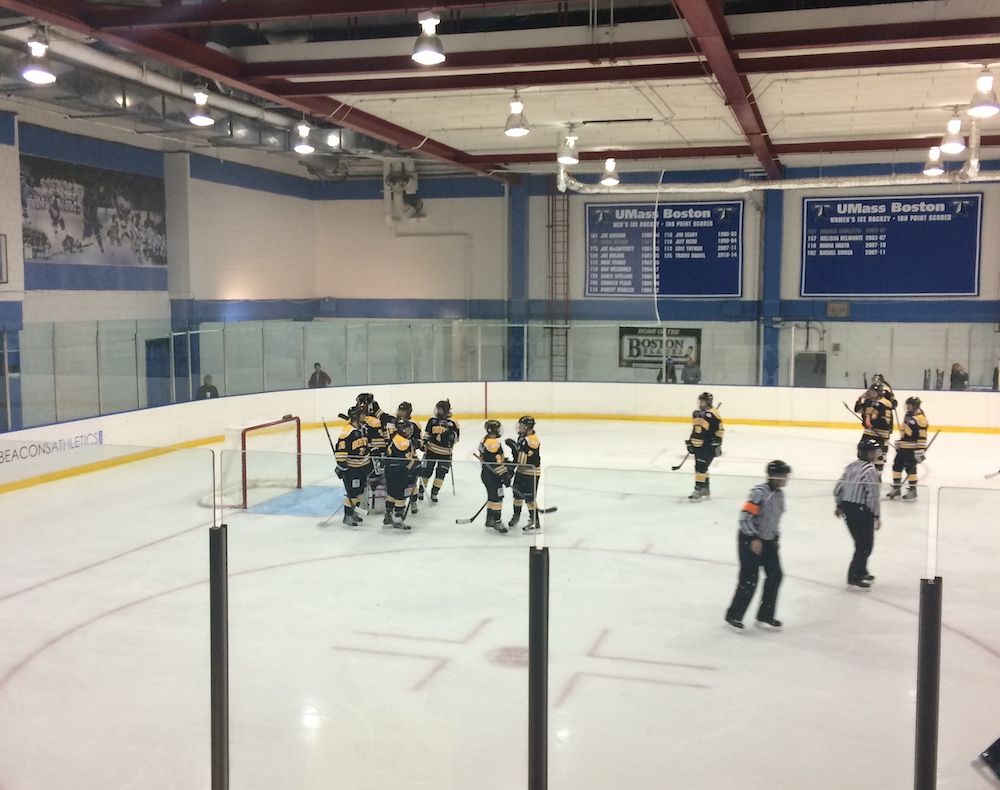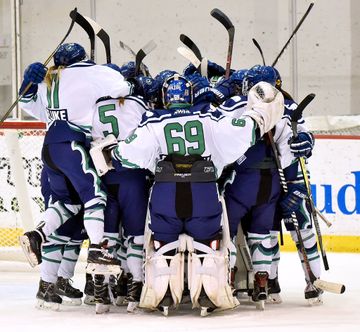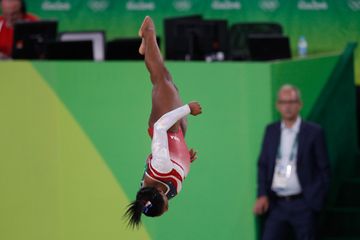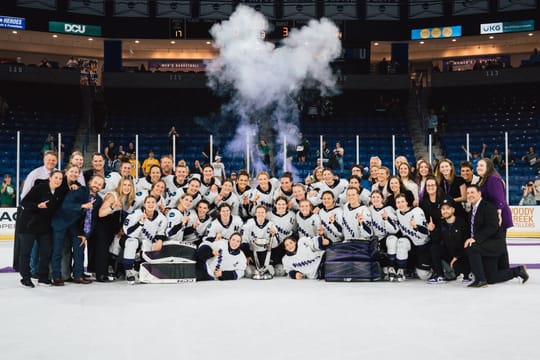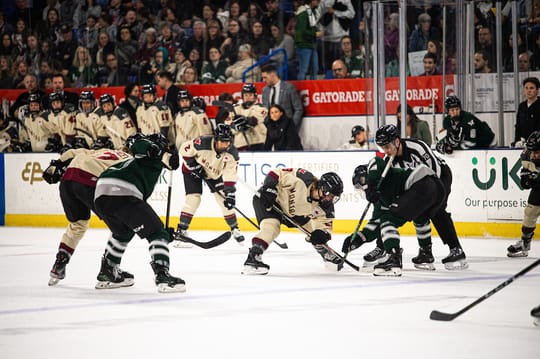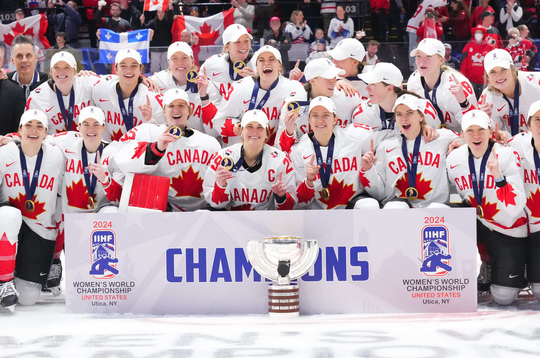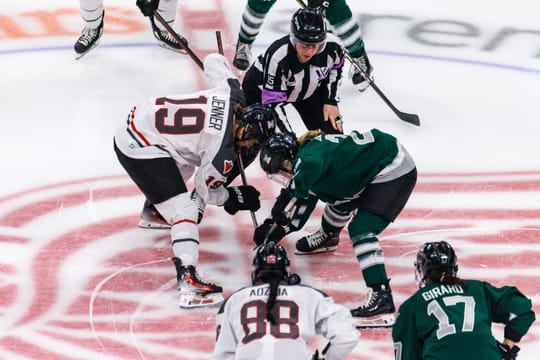On the night of November 20, 2014, the team then known as the Boston Blades held a two-hour practice in the Clark Athletic Center at UMass Boston. It was cold and rainy that night, and the rink, situated in the middle of a small peninsula that extends out into Dorchester Bay, was a remote, dark place that concealed an inner hive of activity and noise – the satisfying clacking sounds of hockey sticks on ice and pucks pounding into the boards.
It was a Thursday, and the team was planning on going on strike that weekend.
The Canadian Women's Hockey League was trying to get the American players on the Blades to sign three-year contract commitments, despite the fact that players at the time were unpaid. In retrospect, this was probably a direct response to the rumors that there was a new, United States-based league (the National Women's Hockey League) planning to launch soon – though the official announcement about the NWHL wouldn't come until March of 2015.
At the time, though, it was just a rumor. After practice, Hilary Knight sat on a folding table next to the bleachers and waved over some of her teammates as they were coming out of the locker room. Through some complex machination of text messages, she'd arranged for me to be there to interview them. At the time, I was reporting for SBNation's Stanley Cup of Chowder, and I was the only beat reporter covering the Blades for any outlet. Still, it was my first time doing beat reporting at all, and I'd only been to a handful of their home games so far. The fact that I was trusted with this story at all is, in hindsight, somewhat absurd.
In the end, I got four players to agree to speak with me on the record, and we did a group interview, standing in the cavernous concourse of the building, with me holding my cell phone to record audio in the middle of a circle. The interview never got fully released, due to the players involved not wanting to hurt their chances of being allowed to continue playing in the league, but it was formative of my understanding of how the CWHL operated with respect to hockey in the States, and an important layer to have as a foundation to my ongoing (and still developing) understanding of the CWHL itself and how Americans and Canadians experience playing and covering women's hockey.
It was also formative in my understanding of Hilary Knight, already an Olympic silver medalist, who was playing for the Blades for no pay, since at that time, if you wanted to play in a professional league in the United States, the Blades were the only game in town. Knight positioned herself as an advocate for her teammates who, unlike her, did not have material, financial support from USA Hockey because they were not national team players; she gathered them, put them in front of a mic with a reporter, encouraged them to advocate for themselves, and stepped aside. It was an interesting and pivotal action at a moment when the future of the sport really was beginning to change.
And a lot has changed since then. Hilary Knight now plays for Les Canadiennes de Montréal, the team who she and her teammates forfeited two games to back in 2014 by going on strike, and who they eventually beat to secure the 2015 Clarkson Cup (though they were called the Montreal Stars then). The strike was resolved when the American players agreed to multi-year contracts anyway, though many of them sought official release to play in the NWHL the following year.
The NWHL has now entered its fourth season, and we've had another Winter Olympics, which saw Knight's American team win gold, instead of silver, for the first time in 20 years. Knight's old team, the Blades, which was a juggernaut when she played for them, has only won three games since they hoisted the Clarkson Cup in 2015 and has recently relocated to Worcester, Massachusetts. There are now 11 women's pro teams in the NWHL and CWHL. Both the leagues offer players financial compensation, and while the rhetoric between the two leagues has been contentious since day one, it has also elevated the overall conversation about pro women's hockey and how it can be better.
I caught up with Knight before the American Thanksgiving holiday to talk about what has changed since that night in 2014 with pro women's hockey, and Team USA's performance in Four Nations. Her quotes have been condensed for clarity.
On the brief Boston Blades team strike in 2014:
"I don't know if there was a miscommunication or just mistreatment, but the Boston team originally in the CWHL wasn't getting its fair shake in support when you compared them to all the other teams." (At the time, the players I interviewed had cited things like promotional and social media efforts, and support for the work-life balance that was necessary to play in Boston while also working full-time.) "When the NWHL opportunity presented itself and came along, it seemed like an amazing opportunity – which it was. Obviously with any startup there's going to be growing pains and things to iron out, but you know overall, the first year was a tremendous success, and the fans loved it, the players were treated well, and we looked to grow for the second year."
On the NWHL's emergence and its effect on the CWHL, and why she went back to the C after playing in the NWHL for two seasons:
"I think it put the CWHL on its toes in many ways, and it sort of forced a little bit faster growth, the growth that we were hoping to have for a few years leading into that. It also capitalized on the momentum from the 2014 Olympics, so it was just an interesting brew kind of happening on the women's front...
"One of the main reasons I came up to Montreal, and decided to switch to the CWHL, is because I'd been in Boston for so many years, and I wanted to experience a different training atmosphere, sort of a personal growth environment. Playing with different players that I'd never played with before – I usually play against them. But also too, I felt that playing in a league whether I like it or not is essentially endorsing that league and I wouldn't feel comfortable endorsing something and having the kids look up to something... you know, when I'm comparing the two, the recent movements and what's happened at the pro level, I think the CWHL is closer. It's a closer model to what I want to see in women's hockey."
On the CWHL's role in the United States:
"I was bummed out that Minnesota didn't join the CWHL, I know there had been talks about that for years, and I think that was sort of just a stale topic, and the NWHL was able to capitalize on that because they sort of had a fresh shake in it all –but I can't really speak to the way that Boston is getting treated right now just because I'm not in Boston. I think the CWHL has really taken a good, hard look at itself and decided they want to be a North American league, and that's why they did in fact keep the team in Boston. Many of the marquee players aren't playing for Worcester, they're playing for the Pride, and I think that just shows good faith, and them acknowledging that they want to have a US presence and really be an international league."
On what type of support is needed for a league to be viable, that players want to play in:
"Obviously we want an extremely competitive place to play, with the support of a town, a city, a fanbase – but also a front office and an existing franchise. To some extent, we do have a little bit of that in both leagues right now, but we need a collaborative effort with a standard of what a bare minimum resource looks like to each team. And I think having access to different marketing tools, being able to have a standard of what's expected on the managing side, will be tremendous in moving the sport forward. And I think we have some of those pieces, they're just not all put into place in the appropriate order."
On the NWHL's Buffalo Beauts and their higher standards for player resources thanks to the acquisition by Pegula Sports and Entertainment:
"I look at that model, and I'm like oh my gosh, imagine if every team could be like that. And that's what a lot of my frustrations came from [with the Boston Blades]. We'd come up to Montreal or Toronto and see all their volunteers, and everything that they had, and they just had it all put together, it felt like. And yeah, in Boston we had Mike Boyle's gym, but that was kind of a separate thing that wasn't necessarily set up by the organization. Imagine if we could have that [like they had in Montreal or Toronto] but in Boston. And not only Boston, but every single market. So, I think what the Pegula family is doing is incredible, I know that my teammates who are there are extremely happy with the support. But at the same time, that needs to be sort of a bare minimum standard for every single team in a league."
On the National Hockey League's role in supporting women's hockey, and being "one league":
"I think the NHL is obviously already involved a lot in women's hockey to begin with, but I think that seeing their involvement at the professional level is going to pay great dividends down the road, and we're going to have access to resources that we didn't have access to before. Some of that is funding, but a lot of it is sort of the other day to day stuff that we don't think about until it's an issue or we've never had it before.
"I think that having two separate leagues is preventing a better future for the growth of women's hockey at the professional level. You know, it's frustrating because certain people are ready to move forward at the level and be under the NHL umbrella so to speak. Others aren't. And granted, they're two separate business models. But if we're in it for the betterment of the game, sometimes you just have to take it and make sure that it's the right decision for everybody involved moving forward."
On Team USA's gold medal performance at Four Nations, and their new coaching staff:
"I think the switch up in the coaching staff sort of gave the group a better energy, and people felt more confident and excited to come to the rink and learn. Obviously we're a great team to begin with, so it's really hard to continue to raise the bar. But the group of women we have in that room and the culture that we've developed over the years, everyone's excited to get better and learn more, and I think that's what people saw at Four Nations. We're playing a completely different style of game and a completely different set of systems and I think our team responded beautifully to that. And you're able to really see the way we that we moved the puck and see the speed, and it was a fun game to be a part of."
Knight's comments are another voice added to the chorus of players who have been indicating that they are in favor of a single league that is affiliated in some way with the NHL and existing franchises. The primary motivation for this seems to be access to resources and raising the standard of how the game is presented and marketed. See Erica Ayala's article about Gary Bettman and Jayna Hefford's visions for women's hockey going forward for more background, as well as the rest of our hashtag-one-league coverage. The NHL's track record with women, diversity, and player safety is notably bad.
Her call for a better and clear standard is also evident, and something that has been wanted in the game for many years. The standard is higher than it has ever been, but it's still not where it needs to be, according to one of the biggest names in the sport. Whether the NHL is actually ready to give more resources and attention remains to be seen.
